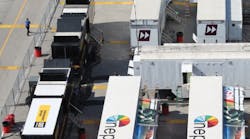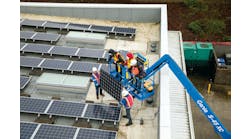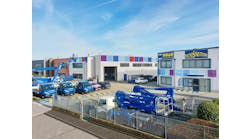It’s storm season again and while forecasts suggest that a below normal hurricane season is on the horizon, they can still hit with brute force and some of the most severe storms have come in relatively mild seasons. And it will soon be winter — sorry to remind you of that — and recent winters have brought some severe weather to the northern climes.
Most people don’t like cold weather much, they prefer the sunshine. Cold weather and lots of rain and snow are not good for the construction business for the most part, although they are good for snow-removal equipment and heater rentals. Such conditions can also be good for power generation because it’s in severe weather that the power tends to go out. This month’s cover story indicates that the power generation market is a growing business and a lucrative one, but you have to know what you’re doing.
The power-generation rental niche is absolutely an unforgiving business. If a skid-steer loader breaks down on the job, a rental company can come fix it or swap it out pretty quickly, but a broken-down generator is likely to lead to more serious consequences. If you’re powering events, it might be pretty hard to explain to an audience that they’ll just have to wait for Act 3 to begin a little late. To be or not to be, that is the question, but you’ll have to wait for the answer! It doesn't work like that. Power went out in the hospital, well, we’ll just finish the surgery a little later; the patient can wait till we close up his heart valves.
Kidding aside, mistakes cannot be tolerated in power generation rental, and rental companies really have to know their stuff to take it on. The specialists have well-trained technicians and some, such as Aggreko, have certified engineers working on specking and preparing jobs. Most rental companies have some generators in their fleet because customers ask for them, but they would hardly qualify as specialists.
One of the points made clear to me by generator specialists is that preparation is critical no matter what the job. It’s not just “bring me a generator, I need power.” It’s a lot more complex than that.
No matter what kind of hurricane season it’s going to be, if you’re doing business in the hurricane region, which — as Hurricane Sandy recently showed us — might be a much wider swath than historical patterns have led us to expect, you have to be prepared, and you need your customers to be prepared as well. With hurricanes you can track them and see them coming. Larger companies are able to stage equipment near where the storm is expected to hit land and have personnel already there.
But it’s not just hurricanes. Weather is more unpredictable than ever before. Snowstorms, earthquakes, tornadoes, ice storms, fires, floods — all these events can cause power outages, as can the aging infrastructure of the sometimes overloaded power grid in many regions. If you’re seriously committed to the power-generation business, or if you just carry a few generators as part of your rental fleet, you should make efforts to see that your customers have a backup power plan. And you can help them design one by checking out their needs and asking the right questions. You can also help your customers save money and possibly drum up some business by approaching it as designing a solution, not just renting a generator.
Generator specialists, such as those written about in the cover story, visit current and prospective clients with lists of essential questions. Phil Wessels at Ring Power, for example, says that in case of emergency, equipment is rented on a first-come, first-served basis, but customers with contingency plans in place will have priority. The company gives out an emergency contact list to customers, as well as state and local authorities, hospitals and temporary shelters. Rental companies should have a step-by-step procedure to get their own facilities up and running in case of the unexpected, since you can’t take care of customers if you can’t take care of yourselves.
Customers need to determine their facilities’ electrical load in advance. They need to prioritize the critical functions in the facility. Logistics need to be planned; the rental company needs to know where to set up the generator for the customer. The plan could be a whole folder or a simple sheet, such as the one-page questionnaire Kohler Power distributor Kinsley Power Systems provides to customers.
You all have your own methods of reaching out to customers. Disaster planning is in the customers’ own best interests, as well as yours, from a business perspective.






